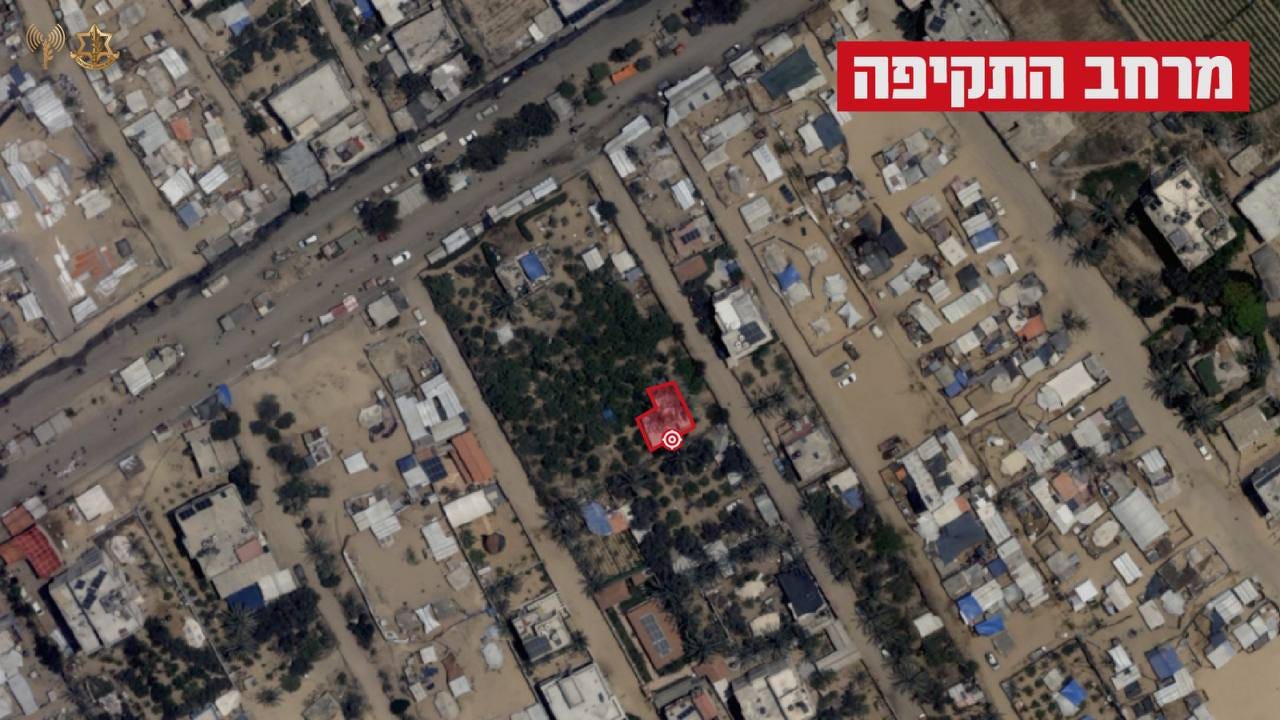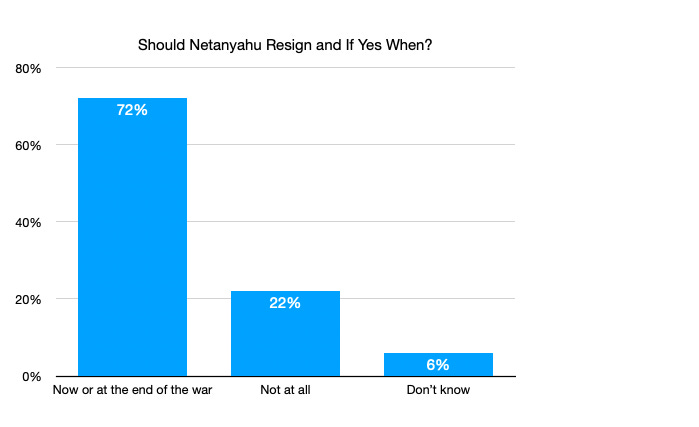Day 281 of the War: Israel Likely Eliminates Mohamed Deif, Soldier Killed in North- Others Wounded, Netanyahu Gives Press Conference
Tel Aviv Diary, July 13, 2024
ZOOM BRIEFING Sunday 6 PM Israel Time, 4 PM GB, 11 AM EDT. 8 AM PDT Invitations will go out in the morning
Over the course of this war, it seems that significant events continue to occur on Shabbat. Today, close to noon, news broke of an Israeli attack in Khan Younis that resulted in numerous casualties. I was on my way to i24 Hebrew News to speak about the U.S. elections when I heard that the attack targeted an important figure. By the time I reached Jaffa, Israeli media reported that the Army’s target was Mohamed Deif, Hamas’s military chief. Soon after, it was confirmed that Deif was not alone. It was verified that Rafah Salameh, Commander of Hamas’s Khan Younis Brigade, was killed along with other Hamas leaders.
Last night, the IDF received what is called “golden information (intelligence)” regarding Deif's location. Overnight, Israel’s intelligence assets worked to ensure Deif was not near any hostages. Once confirmed that eliminating Deif would not endanger hostages, the Air Force was given the green light to carry out the attack. Deif had escaped targeted assassination attempts seven times before. This time, no chances were taken, and eight 1,000-pound bombs were dropped on the area in two strikes. The IDF quickly demonstrated that it did not hit a civilian area by publishing pictures of the targeted building, which showed it was isolated in a grove. The house was completely destroyed.
As of this evening, we do not yet have 100% confirmation that Deif was indeed killed this time. However, there is a growing belief that the operation was successful.
What will be the impact of this latest attack? Assuming the targeted assassination was successful, it represents a significant achievement on two different levels. Israel has already eliminated nearly all the key figures in Hamas’s leadership hierarchy beneath Deif— which will make it increasingly difficult for Hamas to reorganize militarily. More importantly, Deif is a symbol for Hamas, having battled Israel for 30 years (since the first Intifada). His elimination would leave Sinwar as the sole decision-maker of Hamas in Gaza. The fact that IDF Intelligence, together with Shabak (General Security Service), were able to infiltrate Hamas in Gaza to learn Deif's location in real-time is undoubtedly exerting pressure on Hamas.
The big question is how the assassinations will affect the hostage negotiations. Opinions are sharply divided, and it's unclear whether the impact will be negative or positive. The optimistic view is that the attack might have delayed talks for a short period. Still, they will likely resume soon and ultimately may make the negotiations more successful by applying pressure on Hamas to reach an agreement. Until this afternoon, there was significant speculation in Israel regarding whether Prime Minister Netanyahu might undermine the chances of a hostage release and ceasefire agreement, fearing that it could lead to the end of his government. Netanyahu’s statements on Thursday raised great concern. However, nobody has suggested that today’s attack was motivated by political consideration, as it was supported by all the leading figures in the defense establishment, who are also all in favor of reaching an agreement.
The Army is on a maximum state of readiness in anticipation of a response to the targeted assassinations. It is uncertain whether Hamas’s response will come from Gaza, the West Bank, or perhaps Lebanon— this largely stems from the unclear picture of what capabilities Hamas still retains at this point.
EILAT
Two drones heading towards Eilat from the East were intercepted and destroyed before they could enter Israeli airspace.
THE NORTH
On Friday morning, it was announced that Master Sergeant (res.) Valeri Chefonov (33), a reservist, was killed in a drone attack on Thursday
.
Friday was a typical day in the north, marked by five separate rocket barrages. Today, there were six barrages. The IDF announced that it eliminated a rocket crew as they were preparing to launch a barrage at Israel. This evening, during a barrage on Kiryat Shmona, two young female soldiers were very seriously wounded, and four others sustained lighter injuries.
On Friday, the IDF Spokesperson's Office issued two statements regarding the ongoing conflict inside Gaza, one on Thursday night and another on Friday:
Combat fighters from the 99th Division Command raided a Hamas combat compound that previously served as a UNRWA compound. Maglan and Egoz forces, guided by the Intelligence Directorate, raided the compound and arrested militants attempting to flee the area.
During the operation, the forces engaged in hand-to-hand combat with militant squads that had fortified themselves in the compound and discovered parts for assembling UAVs, observation command centers, and numerous weapons including drones, rockets, machine guns, mortars, explosives, grenades, and more. In further searches, the forces raided a university where the fighters found an underground lab for manufacturing explosives and weapons.
IDF Spokesman’s second release:
The IDF, guided by intelligence from the Shin Bet and Military Intelligence Directorate (“Aman”), eliminated the deputy commander of the Shuja'iyya Battalion of the Hamas terrorist organization, the militant Ayman Shweidah, using a fighter jet.
Ayman previously served as a senior official in the Hamas operations headquarters and was involved in directing the massacre on October 7th. During the war, he participated in combat with the Shuja'iyya Battalion and directed many terrorist operations against our forces.
Along with Ayman, a company commander in the Shuja'iyya Battalion, the militant Abada Abu Hinn, a veteran militant in the battalion who played a significant role in the fighting, was also eliminated. Additionally, as part of the 98th Division's operation in the Shuja'iyya area, over 150 additional militants were eliminated.
HOSTAGES
Leaving aside the potential impact of today's assassination on the negotiations, there was growing optimism at the end of this past week that we were getting closer to securing an agreement. President Biden announced that a preliminary agreement on a framework had been reached. However, on Friday, Netanyahu issued a statement that reports of Israel's plan to vacate the Philadelphia corridor and the Rafa crossing are false. The Philadelphia corridor issue is new, as previously, it was assumed that withdrawing from major urban areas in Gaza would also include the Philadelphia corridor, which is partially located within Rafah.
Discussions are underway to craft a technical solution, allowing Israel to install and leave sensors along the border between Gaza and Egypt.
Today marked the completion of a four-day march from Tel Aviv to Jerusalem by the families of the hostages and scores of supporters. By the time the march reached Jerusalem, thousands had joined the procession.
DEMONSTRATIONS
Tonight, the customary weekly rallies took place in Tel Aviv at Hostage Square and on Kaplan Street. At Hostage Square, Andrey Kozlov, who was rescued from Hamas captivity four weeks ago, briefly addressed the crowd. Kozlov was received with sustained ovations
.
NETANYAHU PRESS CONFERENCE
Tonight, Prime Minister Netanyahu held his first press briefing in 100 days, where he once again spoke about achieving a “final victory” and the necessity of winning the war. Netanyahu reiterated the need to continue the war until a decisive victory is secured. Given Netanyahu’s current rhetoric, I find it difficult to see how an agreement can be reached.
When asked about the convening of a National Commission of Inquiry, Netanyahu once again claimed any official inquiry should only be conducted after the war, a war he stated could go on indefinitely. When asked why he had not met with Kibbutz members whose Kibbutzim were pillaged on October 7th, Netanyahu lied and claimed he did. When questioned why his eldest son—who lives in Miami—was publicly attacking the IDF Chief of Staff and the Army, creating division in the country, Netanyahu replied that he loves his son, who is an adult and is entitled to his opinions. Netanyahu then went on to criticize the press, who he claimed were part of an organized campaign to call for a new national election.
LATEST OPINION POLLS
On Friday night, Channel 12 released an interesting survey:
The results of the survey indicate that 23% of the public opposes the current hostage/ceasefire agreement. Last week, I participated in a panel discussion with people I had never met before. All were politically to the right of me, some significantly so. It became clear during the discussion that at least four of the other five panelists opposed the agreement. Two of them explicitly stated that the lives of the 120 hostages were not worth the strategic cost of foregoing total victory. I was quite taken aback to hear such opinions voiced openly.
WEST NILE DISEASE
During the current outbreak, 356 individuals have been diagnosed with West Nile disease in Israel, resulting in 31 deaths to date.
∞–––––∞–––––∞–––––∞–––––∞–––––∞–––––∞–––––∞–––––∞–––––∞
A PIECE OF HISTORY
Hamas Bus Bombings
In 1994, Israel was shaken by two devastating suicide bombings orchestrated by Hamas, significantly escalating the ongoing conflict. The first attack occurred on April 6th in Afula, where a car bomb exploded next to a crowded bus stop. The bombing, planned by Hamas chief bomb maker Yahya Ayyash, utilized a stolen 1987 Opel Ascona rigged with gas cylinders, hand grenades, and over 1,000 carpenter nails. The suicide bomber, 19-year-old Ra'id Zaqarna from Qabatya, detonated the device as students boarded bus line 348. The explosion resulted in the deaths of 8 people and wounded 44 others. The victims included both Jewish and Arab Israelis, highlighting the indiscriminate nature of the attack.
Just a week later, on April 13, another Hamas-orchestrated bombing struck in Hadera. This time, 21-year-old Amar Salah Diab Amarna boarded a bus to Tel Aviv carrying a bomb constructed by Ayyash using two kilograms of homemade acetone peroxide explosive. At 9:40 am, as the bus was leaving the station, Amarna placed the bomb on the floor and detonated it, causing widespread carnage. In a cruel twist, a second pipe bomb exploded as rescue workers arrived at the scene, further complicating relief efforts.
The attacks demonstrated a disturbing level of sophistication and planning by Hamas. Ayyash's involvement in both bombings showcased the group's growing expertise in creating devastating explosive devices. The use of nails and strategically placed bombs was designed to maximize casualties and create terror among the civilian population. These tactics, combined with the selection of crowded public transportation spots as targets, marked a grim new chapter in the conflict.
The bombings had a profound impact on Israeli society and severely undermined the nascent peace process. These terror attacks occurred during a period of ongoing negotiations, with one survivor in Afula noting he had been reading about the Oslo peace talks just moments before the explosion. The attacks struck at the heart of daily life, targeting buses and stations filled with students and commuters. Witnesses described horrific scenes of charred bodies, dismembered victims, and young people engulfed in flames, leaving deep psychological scars on survivors and first responders alike.
The bombings in Afula and Hadera were part of a larger wave of attacks that would continue throughout the 1990s, challenging efforts at peace and shaping Israeli security policies for years to come. The deliberate targeting of civilians and the use of suicide bombers as weapons marked a sinister escalation in the conflict, in which Hamas began employing tactics intentionally meant to disrupt the peace process.









